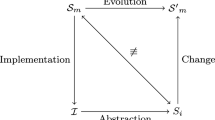Abstract
During the development of system requirements, software system specifications are often inconsistent. Inconsistencies may arise for different reasons, for example, when multiple conflicting viewpoints are embodied in the specification, or when the specification itself is at a transient stage of evolution. We argue that a formal framework for the analysis of evolving specifications should be able to tolerate inconsistency by allowing reasoning in the presence of inconsistency without trivialisation, and circumvent inconsistency by enabling impact analyses of potential changes to be carried out. This paper shows how clustered belief revision can help in this process.
Preview
Unable to display preview. Download preview PDF.
Similar content being viewed by others
References
Alchourrón, C.A., Makinson, D.: On the logic of theory change: Contraction functions and their associated revision functions. Theoria 48, 14–37 (1982)
Benferhat, S., Garcia, L.: Handling Locally Stratified Inconsistent Knowledge Bases. Studia Logica 70, 77–104 (2002)
da Costa, N.C.A.: On the theory of inconsistent formal systems. Notre Dame Journal of Formal Logic 15(4), 497–510 (1974)
Duffy, D., et al.: A Framework for Requirements Analysis Using Automated Reasoning. In: Iivari, J., Rossi, M., Lyytinen, K. (eds.) CAiSE 1995. LNCS, vol. 932, pp. 68–81. Springer, Heidelberg (1995)
Easterbrook, S., Nuseibeh, B.: Using View Points for Inconsistency Management. Software Engineering Journal 11(1), 31–43 (1996)
Finkelstein, A., et al.: Inconsistency handling in multi-perspective specifications. IEEE Transactions on Software Engineering 20(8), 569–578 (1994)
Gärdenfors, P.: Knowledge in Flux: Modeling the Dynamics of Epistemic States. The MIT Press, Cambridge (1988)
Gärdenfors, P., Makinson, D.: Revisions of knowledge systems using epistemic entrenchment. TARK II, pp. 83–95. Morgan Kaufmann, San Francisco (1988)
Heitmeyer, C., Bharadwaj, R.: Applying the SCR Requirements Method to the Light Control Case Study. Journal of Universal Computer Science 6(7) (2000)
Huth, M.R., Ryan, M.D.: Logic in Computer Science: Modelling and Reasoning about Systems. Cambridge University Press, Cambridge (2000)
Nebel, B.: Syntax based approaches to belief revision. Belief Revision, 52–88 (1992)
Nuseibeh, B., Kramer, J., Finkelstein, A.: A Framework for Expressing the Relationships Between Multiple Views in Requirements Specification. IEEE Transactions on Software Engineering 20(10), 760–773 (1994)
Queins, S., et al.: The Light Control Case Study: Problem Description. Journal of Universal Computer Science, Special Issue on Requirements Engineering: the Light Control Case Study 6(7) (2000)
Rodrigues, O.: A methodology for iterated information change. PhD thesis, Department of Computing, Imperial College (January 1998)
Rodrigues, O.: Structured Clusters: A Framework to Reason with Contradictory Interests. Journal of Logic and Computation 13(1), 69–97 (2003)
Ryan, M.D.: Default in Specification. In: IEEE International Symposium on Requirements Engineering (RE 1993), San Diego, California, January 1993, pp. 266–272 (1993)
Spanoudakis, G., Zisman, A.: Inconsistency Management in Software Engineering: Survey and Open Research Issues. In: Chang, S.K. (ed.) Handbook of Softawre Engineering and Knowledge Engineering, pp. 329–380 (2001)
Zowghi, D., Offen, R.: A Logical Framework for Modeling and Reasoning about the Evolution of Requirements. In: Proc. 3rd IEEE International Symposium on Requirements Engineering RE 1997, Annapolis, USA (January 1997)
Author information
Authors and Affiliations
Editor information
Editors and Affiliations
Rights and permissions
Copyright information
© 2004 Springer-Verlag Berlin Heidelberg
About this paper
Cite this paper
Rodrigues, O., Garcez, A.d., Russo, A. (2004). Reasoning About Requirements Evolution Using Clustered Belief Revision. In: Bazzan, A.L.C., Labidi, S. (eds) Advances in Artificial Intelligence – SBIA 2004. SBIA 2004. Lecture Notes in Computer Science(), vol 3171. Springer, Berlin, Heidelberg. https://doi.org/10.1007/978-3-540-28645-5_5
Download citation
DOI: https://doi.org/10.1007/978-3-540-28645-5_5
Publisher Name: Springer, Berlin, Heidelberg
Print ISBN: 978-3-540-23237-7
Online ISBN: 978-3-540-28645-5
eBook Packages: Springer Book Archive




